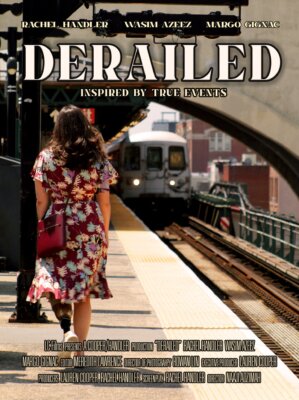 Writer, actress, director, and producer (sometimes all at the same time), Rachel Handler is a powerhouse. She has a special way of packing a punch with her narrative shorts — most of which are under six minutes long — by providing windows into experiences that are normal to some but never before thought about by others.
Writer, actress, director, and producer (sometimes all at the same time), Rachel Handler is a powerhouse. She has a special way of packing a punch with her narrative shorts — most of which are under six minutes long — by providing windows into experiences that are normal to some but never before thought about by others.
Whether you are watching Andy and Kaliope, a capsule into the life of one of the 30-50% of children with disabilities waiting in the adoption system in the U.S. currently, or, her latest film, DERAILED, about the unique systemic barriers and romantic challenges faced by an amputee, you’ll find that these fresh perspectives work so effectively because they simultaneously appeal to experiences or emotions relatable to any viewer. At their heart, each film is about finding love and having the tools to thrive, things most everyone strives for in their own lives.
Handler, who became an amputee from a car accident in 2012, tells Disability Belongs™ that while there have been enormous health and mobility effects following her amputation, “the biggest struggles in my life come from the way society views disability and handles accessibility.” Her scripts grapple with these challenges for catharsis, likely, but also for reinvention and change. The more these kinds of stories are told, the more those in society realize what attitudes they should model after.
DERAILED was born out of the rage Handler felt when a subway station near her home base in New York City underwent major renovations while the opportunity to make it accessible went ignored. Playing lead actress, Handler places herself directly into the narrative, weaving in the real-life rage she felt along with true acting, as she takes on the role of Isabelle.
Across the film’s five minutes, scenes switch between Isabelle’s third date with Jason, and Isabelle recounting the story of her date to her friend Sarah, a wheelchair-user. As the opening credits come up and the train lets out Isabelle, the music is as upbeat.
Isabelle and Jason are headed to a barbecue restaurant when Isabelle, an amputee, asks if there is any elevator or escalator to get from the above-ground platform to the street. There is not, leading Isabelle to express her frustration, while still keeping things lighthearted and upbeat. That is, until Jason’s responses grow from what seems like a simple misunderstanding to a firmly ignorant stance that the city shouldn’t have to spend money on accessibility.
“How many of these people in wheelchairs are really going out that much?,” he asks at one point. When the scene flickers back to Isabelle’s apartment with her friend Sarah, we see Sarah scoff at this comment and say, “I hope you walked away and didn’t look back.”
Attempting one last appeal at empathy, Isabelle doesn’t walk away. She makes the point that we’re all just one step away from a broken ankle. Unfortunately, Jason continues to excuse the city. The two actors’ body language already had changed dramatically throughout the conversation, edging toward this moment, where Isabelle finally pumps the brakes on the date and turns to head home.
Jason pleads with her to wait. He tries to make the point that he is a proponent of Disability Rights, and that there are plenty of accessible buses for those who can’t take the metro. But he admits himself that he doesn’t use buses often because they are slower and have longer waits.
Jason separates himself — and even Isabelle, despite her being an amputee — from the disabled community again and again throughout their short interaction. He fails to acknowledge that those with disabilities are worthy of the same respect or opportunities he and other non-disabled people have.
The scenes of Isabelle’s retelling of the nightmarish date with her friend Sarah not only offer comedic respite, they also highlight something a lot brighter than this ignorant interaction: the importance of finding disabled community. Being an amputee myself, I have had my fair share of romantic woes because of my date’s lack of understanding about my needs as a disabled person. At times, I have felt frustratingly alone in my experiences. Finding those who can relate, and seeing these stories on screen, shows me and others that we aren’t alone.
Screenplay author and actress Handler explains that her mission in writing DERAILED was to “highlight the frustrations of living in a world still filled with systemic barriers, while also bringing [to] attention the personal and emotional impact of such everyday obstacles.” The final minute of the short — easily my favorite scene — seals this mission off with a perfectly messy bow.
DERAILED recently has hit film festival circuits and was the winner of the Sundance Co//ab Speak Your Truth Challenge.






